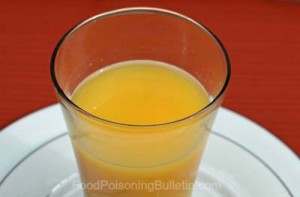A new study published in the International Journal of Food Science & Technology has found that high hydrostatic pressure (HHP) can make unpasteurized fruit and vegetable juices safer. Juice with a low acidity level, or pH greater than 4.6, is an ideal medium for pathogenic bacteria, especially since it’s so high in water. In fact, there was an outbreak of Shiga toxin-producing E. coli in Michigan earlier this month linked to unpasteurized, unlabeled apple juice.
 Since consumers want minimally processed, nutrient dense foods made without additives or preservatives, manufacturers have been trying to find ways to make foods safe. High hydrostatic pressure may be an alternative to pasteurization. That process also preserves the nutritional value, flavor, texture, and color of the product because it has little effect on the compounds such as vitamins and flavor compounds that make up those attributes.
Since consumers want minimally processed, nutrient dense foods made without additives or preservatives, manufacturers have been trying to find ways to make foods safe. High hydrostatic pressure may be an alternative to pasteurization. That process also preserves the nutritional value, flavor, texture, and color of the product because it has little effect on the compounds such as vitamins and flavor compounds that make up those attributes.
More research has been conducted on the quality of HHP-treated juices than on the food safety aspect. The researchers concluded that more studies should be done on high hydrostatic pressure treatment of fresh juices to reduce bacterial load.




